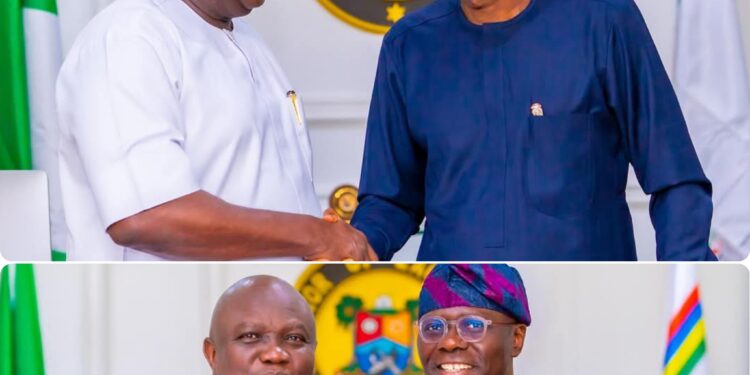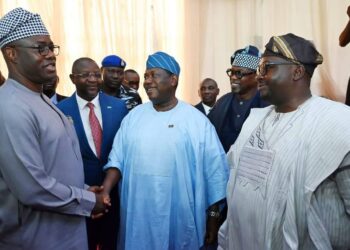
By Ibrahim Kegbegbe
When I penned my widely circulated opinion piece, “The Lagos Governorship Plot: Why Seyi Tinubu Is a 2031 Project, Not 2027”, published by The Merit Newspaper on April 9, 2025, it was a deliberate attempt to demystify the growing speculations surrounding the political future of Seyi Tinubu, son of President Bola Ahmed Tinubu. I argued that Seyi’s political rise, while inevitable within the Tinubu political dynasty, is better positioned for 2031—not 2027—due to both strategic timing and regional political calculus.
Now, as Lagosians and political analysts continue to speculate over who will succeed Governor Babajide Sanwo-Olu in 2027, I feel compelled to provide further insight into the succession conversation and offer a proposition rooted in logic, political reality, and long-term strategy for the All Progressives Congress (APC): that the best candidate to carry the party forward in Lagos is none other than former Governor Akinwunmi Ambode.
A Politician’s Return or a Technocrat’s Redemption?
Ambode’s tenure as governor between 2015 and 2019 was not without controversy, especially within the inner circles of Lagos APC stalwarts. His technocratic approach and reluctance to play the traditional political game created friction with the party hierarchy. However, time—and Lagosians’ collective memory—has painted a clearer picture of his administration’s competence, particularly in urban renewal, infrastructural upgrades, financial prudence, and civil service reforms.
Ambode’s governance style resonated more with ordinary Lagosians than party loyalists. In today’s increasingly politicized Nigeria, where public trust in governance continues to wane, a return to technocratic leadership could serve as a redemption arc—not just for Ambode but for the ruling party itself. He remains a figure with considerable public goodwill, even after years in political wilderness.
READ ALSO:The Lagos Governorship Plot: Why Seyi Tinubu Is a 2031 Project, Not 2027
Why Ambode? Why Now?
The stakes for Lagos APC in 2027 are unusually high. Governor Sanwo-Olu’s two-term tenure will have run its course, and the state party machinery will need a candidate who can retain public confidence while preserving the long-term interests of the Tinubu political structure.
Seyi Tinubu, as I stated previously, is not a 2027 project. His increasing public presence—philanthropic engagements, especially the sponsorship of Iftar programmes during the 2025 Ramadan across Northern Nigeria and Lagos—may signal future ambitions. But these gestures are more about consolidating his father’s national legacy and building goodwill across the country than they are about immediate power grabs in Lagos. The political infrastructure needed to elevate him to governorship must be meticulously arranged. 2027 is simply too early for such a move.
That leaves the APC with two options: field an untested loyalist with little electoral magnetism or deploy a trusted name with proven governance capabilities—Ambode fits the bill.
A Strategic Bridge to 2031
Ambode is not only the most logical choice for APC’s survival in 2027; he is also the perfect placeholder in the party’s long-term game plan. With only one term left to constitutionally serve, Ambode’s return would neither disrupt internal party succession plans nor threaten the ambitions of emerging political figures like Seyi Tinubu.
If APC allows Ambode to govern from 2027 to 2031, the party can then strategically unveil Seyi Tinubu as the preferred successor, giving him ample time to prepare, build networks, and launch his campaign on a platform of continuity, not disruption.
Moreover, Ambode’s return will send a strong message about the APC’s willingness to prioritize performance over patronage, and to reconcile with capable party members once sidelined for political reasons.
Hon. Obasa and Other Contenders: The Counterweight
Of course, there are other potential contenders. The Speaker of the Lagos State House of Assembly, Hon. Mudashiru Obasa, who recently survived an impeachment scare, remains a powerful force within the Lagos political structure. His reinstitution signaled the resilience of his faction. Some believe he might be nursing ambitions of his own, possibly eyeing the governorship seat.
However, while Obasa has deep political roots and legislative experience, Lagosians may yearn for a more administrative, development-driven leader in 2027—a void that Ambode naturally fills.
A Calculated Permutation
Politics, as always, is about timing, perception, and balancing competing interests. The Lagos APC must play the long game to remain relevant and maintain public trust. Akinwunmi Ambode is not just a former governor—he is a bridge figure, a technocrat with unfinished business, and a political balancing act that can buy the party four years of relative calm and preparation before what may become a generational shift in 2031.
Seyi Tinubu will have his moment, but that moment must be cultivated, not rushed. As for 2027, APC’s best bet lies in returning to a familiar face—one who understands governance and has the public profile to win elections beyond party structures.
READ ALSO:Eti-Osa 2025: Between Proven Continuity and Promising Change — The Chairmanship Race That Matters
Ambode may not be loved by every politician, but he remains the only man capable of putting a round peg in a round hole at a time when Lagos needs stability, performance, and foresight.
The choice is clear. The time is right. And the strategy must be sound.
Ibrahim Taofeek Kegbegbe
The Head of Media and Publicity Secretary Bullion Records; The Editor-in-chief -The Merit Newspaper
















